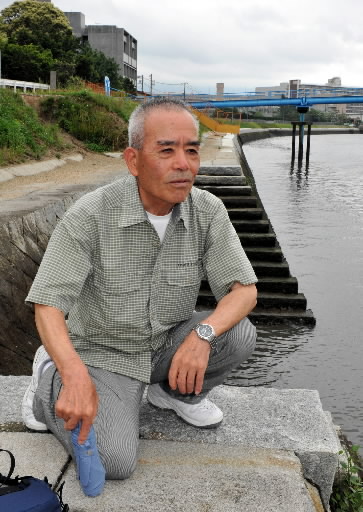Nuclear Reactors Rekindled, Part 1, Article 1
Jul. 1, 2012
Part 1: Through the eyes of A-bomb survivors
Article 1: A-bomb survivors find their voices
by Michiko Tanaka, Staff Writer
“Nuclear energy brings suffering, just like the atomic bomb”
Can human beings coexist with nuclear energy? Though questions posed by the accident at the Fukushima No. 1 (Daiichi) nuclear power plant remain unanswered, the No. 3 reactor at the Oi nuclear power plant in Fukui Prefecture has been restarted. With 67 years soon to have passed since the atomic bombing of Hiroshima, the Chugoku Shimbun takes a close look at the nation’s nuclear reactors, their flames now rekindled and flickering, through the eyes of A-bomb survivors, who are keenly aware of the horror unleashed by atomic power.
For many years Shigeru Tanaka, a resident of Nishi Ward, Hiroshima, was reluctant to visit the site of his birth. Mr. Tanaka, 74, gazed at the surface of the Enko River in Ozu, Minami Ward, the area where his house had once stood. “I don’t want to remember what happened,” he said.
His memories have remained buried at the bottom of his heart. However, Mr. Tanaka has decided to share his account of the atomic bombing at a gathering to be held this August 6. Behind his willingness to now speak out are the accident at the nuclear plant, which spewed radioactive substances into the environment, and the issue of restarting operations at idle power stations.
After surviving the atomic bombing, Mr. Tanaka, along with his parents and two younger sisters, moved to his older brother’s house in the city of Kure, not far from Hiroshima. But as soon as he entered a new elementary school there, he was stung by the words describing him: “Don’t play with that boy. He was exposed to the A-bomb. You’ll get infected, too.”
Later, when he wanted to marry, Mr. Tanaka faced opposition from his wife’s family, so the couple left the Hiroshima area. They gave up the idea of having children. And Mr. Tanaka was forced to change jobs because of the prejudice and discrimination he suffered once people found out he was an A-bomb survivor. Then, at the age of 38, he developed cataracts in his eyes. Although he was frightened by the possibility of falling ill to other “A-bomb diseases,” Mr. Tanaka did not attempt to acquire the A-bomb Survivor’s Certificate until he was in his 50s. “For my wife’s sake,” he returned to Hiroshima after his retirement.
August 6 will mark the second time he has shared his A-bomb experience with an audience. Three summers ago, he agreed to share his account with a group of junior high school students and teachers. But his heart ached as he spoke, and he became choked up a number of times. Afterward, he vowed “never to speak again.”
But whenever Mr. Tanaka heard that the people in Fukushima suffering from the nuclear accident were being discriminated against, he bristled with anger. He began to doubt those who were pushing to restart operations at the nation’s nuclear power plants. “Both atomic bombs and atomic power cause people suffering,” he said. “We have to cut back on the number of nuclear power plants in use. The issues involving Fukushima haven’t been resolved yet, so it’s too early to restart the plants.”
A-bomb survivors’ organizations in Hiroshima have begun to make an unambiguous appeal for an end to Japan’s reliance on nuclear energy. On August 6, this call will be made by seven A-bomb survivors’ organizations to Japanese government officials taking part in the Peace Memorial Ceremony in Hiroshima. It will be the first time that all seven organizations are voicing their opposition to nuclear energy since the meetings with government officials designed to hear requests from the representatives of survivors were initiated in 1976. Until now, the groups had avoided the issue of nuclear energy, due to differences of opinion over the idea of atomic power’s “peaceful use.”
At the same time, some A-bomb survivors believe that “Hiroshima and Fukushima should not be equated.” Sunao Tsuboi, 87, chairman of the Hiroshima Prefectural Confederation of A-bomb Survivors Organizations, has heard this view from some survivors. “In an instant, the A-bomb survivors were exposed to a massive dose of radiation and the heat rays from the bomb. They saw a lot of lives lost right before their eyes. It’s their grief that makes them feel this way,” Mr. Tsuboi explained.
Nuclear weapons and nuclear energy: the A-bombed city of Hiroshima had been viewing these two in a different light.
“Hiroshima must stand by Fukushima, because the A-bombed city knows the same grief that radiation brings,” Mr. Tsuboi said. “We must be committed to squarely addressing the issues involving the use of nuclear energy.”
A-bomb survivors see reflections of themselves in the people of Fukushima, whose suffering began when disaster struck at the nuclear plant. Posing questions to themselves in the wake of the accident, the survivors have begun to find their voices.
(Originally published on July 16, 2012)








